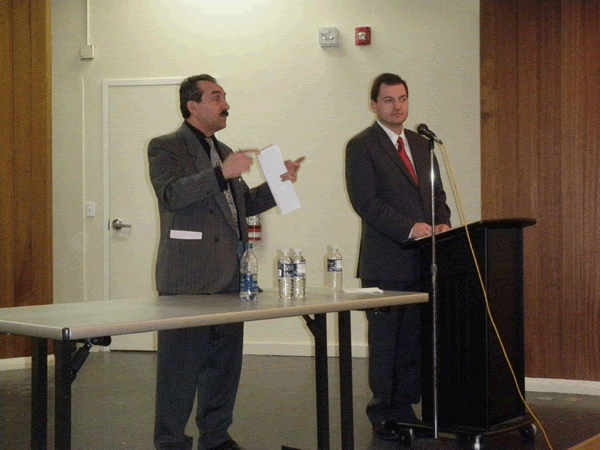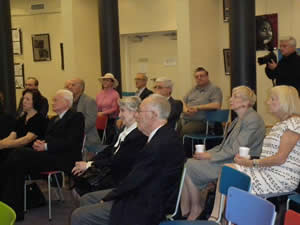Parliamentary Elections and Procedure in Macedonia 2014

Many of the people that were born here, first generation Canadians and the ones that emigrated from Aegean Macedonia, are not familiar with the system of voting, parliamentary procedure and representation in the Republic of Macedonia today.
Pavle Sazdov, parliamentarian and the present North and South American representative of the “registered” community members that are entitled to vote in the elections in Macedonia, gave a very comprehensive overview of the political system in Macedonia on a Sunday in April. He told us how one becomes registered (you need a Macedonian passport as well as identification of your residence, such as a Canadian passport as well as an application obtained at the various Consul General offices throughout the world.) The Republic has opened several new consuls throughout North and South America and worldwide to give people an opportunity to access this important civil right.
There are three representatives elected by the Macedonian diaspora. One rep from North and South America, one from Europe and Africa and another from Asia and Australia. He also said that there are usually about 4 or 6 candidates from the various political parties in Macedonia. Because he was from the DPNE party formed many years ago. In fact, the history of the party includes VIMRO which was the revolutionary party which
In fact, there are a number of political parties in Macedonia. You can form one with 10,000 signatures or signature from your colleagues in parliament. Some of the larger parties form off-shoot political parties which are slightly different than their own ideology. And because you can run for office while IN office, such as being a mayor of a municipality, and then if you actually get elected to parliament, you need to decide which job you want.
The President is largely ceremonial, but essential. A bill cannot be passed without the President’s signature, much like our Canadian Senate. Sober second thought! He/she can be elected from a party which is not the current dominant party, but this usually does not occur.
One of the members asked at question period about the judiciary, as to whether they are appointed or elected. The reply was that they are appointed by the President(?) for life.
The President deals with education, culture, +++?????
As I looked around the room, I realized that many of the attendees were people that probably knew all of the above. We had hoped to have many of our first and second generation Canadians of Macedonian descent attend and learn about what is happening in Macedonia, the only piece on earth that claims this name proudly. That is why we make sure that our lectures are in English, as everyone who needs to learn about various subjects will understand. And Mr. Sazdov delivered the information very well. He spoke about the history of how Macedonia achieved this political process.

Unfortunately he could not speak about the various ideologies of the other parties which are major in Macedonia – about six. There are anywhere from 33 to 70 different political parties, some very small and only formed because someone had 10,000 signatures in order to form a party. His party is deemed to be right of center, and there is one that is left of center (the Communist party), while the Albanians which form about 20 percent of the population in Macedonia have parties that are also right of center as well as left of center. Obviously there are no centrist parties.
It was mentioned that there are approximately 300,000 Macedonians in the Diaspora. Possibly 150,000 in the Toronto region alone. However, there were 1,200 who registered in the last election, which is about .8% of the population. Of course, one has to realize that we are from three separate regions (Aegean, Pirin and the Republic (Vardar). And try as they might, with the establishment of various consul offices in various cities throughout Canada and the United States, to inspire and encourage people who have a Macedonian passport (or go through the hoops to obtain one) one has to be a dedicated Macedonian to make that effort. It has to be discouraging for the government in Macedonia which has given the Diaspora this opportunity to vote. Obviously, not all countries have given this important right to citizens in the Diaspora.
The event was very well received by the people attending, and I still feel that it was worthwhile, which if you missed it, you missed an opportunity to ask questions, and engage with a member of parliament of the Republic of Macedonian. This is a very complex area of the world and I think it is important that we in Canada know more about what many in our community are voting for, or against.
There are many more unanswered questions and facts that would be interesting to know in regards to the voting system. How much money does a candidate normally spend to promote him/herself in becoming elected? Is there a limit to the amount that can be spent? Did you know that Macedonia ranks 34th globally in overall rule of law performance, and that Macedonia has the highest share of female MPs in the Balkans.